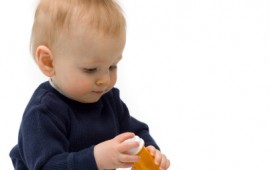It’s Poison Prevention Week!
Author: Shannon Miller Lifestyle

For poison prevention week, why not take inventory of your household chemicals?
After all, many things can be poisonous to a child: cleaning products, medicines, soaps,and alcohols to name a few. Your child may come home with “Mr. Yuk” stickers for you to put on your poisons. This school program educates children on the dangers of poisons and then gives you, the parent, the opportunity to educate your child on the poisons in your own home.
This is what a Mr. Yuk sticker could look like:
What items can poison my child?
- Cleaning supplies
- Medicines
- Cosmetics
- Personal care items (most common)
- Alcohol
Placing a Mr. Yuk sticker on an item will not automatically change your child’s curiosity, of course.
- Medicines and chemicals should be out of children’s reach and locked in a cabinet.
- Personal care and cosmetic items are a specific concern, especially in pretty packaging.
Should I worry about anyone else in my household?
Children under six only represent 2% of all poisonings! (per www.poison.org) . The large majority of poisonings are unintentional exposures to poisons. Poisons are everywhere: home, the workplace, hospitals, and our general environment. Adults are less likely to be shielded from poisons, which is why so many adults can unintentionally be exposed to chemicals, and then ignore or misdiagnose their symptoms.
What are symptoms of poisoning?
Any of the following could be symptoms of poisoning.
- Nausea
- Vomiting
- Pain
- Trouble breathing
- Seizure
- Confusion
- Abnormal skin color
(Source www.emedicine.com)
Though these symptoms can appear to be a stomach virus, the flu, or asthma, poisoning should be considered as a possibility.
What do I do if I think someone in my household has been poisoned?
The National Poison Control Center hotline is 1-800-222-1222. Your children should memorize this number. When you call, have the suspected substance ready, so that you can tell the center what you suspect. He or she can talk you through your suspicion, and then tell you what to do immediately.
What about prescription medications?
“Acute medication poisonings account for nearly one half of all poisonings reported in the United States and should be considered in persons with an acute change in mental status.”(Frithsen, Ivar, “Recognition and Management of Acute Medication Poisoning”, American Family Physician, 2010 Feb, 1:8). The majority of medication poisonings are over dosages on pain medications. Always check the label and follow the instructions of the doctor. Also, double-check that other medications do not have more pain medicine. When you take a regular pain medicine and then multiply it with another medicine that has the same or a similar pain medicine, the result in an overdose. NSAID’s (non-acetomenophen) compound each other and can cause poisoning when they are added on top of each other. Taking Acetomenophen plus other medicines needs specific doctor instruction. Make sure your doctor sees that you have mixed medications so that he can adjust your dosage accordingly.
Always cross check your medicines, over the counter and prescription, to make sure they do not cause a deadly reaction.
- Many pharmacies now do the cross-checks for their patients, but each individual needs to double check for himself.
- To cross check your medications for indications and problem areas, visit the FDA Drug Safety website.
